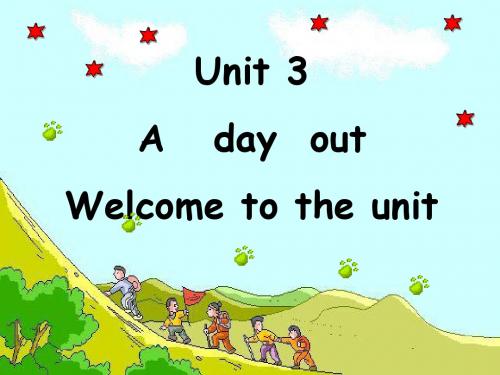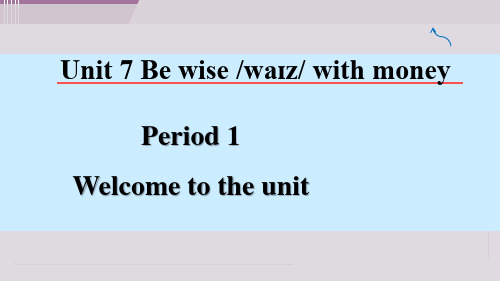01 welcome to the unit
- 格式:ppt
- 大小:1.51 MB
- 文档页数:10


牛津译林版英语九上Unit 4《Growing Up》(welcome to the unit)教学设计一. 教材分析《Growing Up》是牛津译林版英语九上Unit 4的教学内容,主要讨论成长过程中的变化和经历。
通过本节课的学习,学生能够掌握描述人物外貌、性格和兴趣的词汇和句型,提高听说读写的能力。
教材内容丰富,贴近学生的生活,有助于激发学生的学习兴趣。
二. 学情分析九年级的学生已经具备一定的英语基础,对于描述人物和事件的词汇和句型有所了解。
但部分学生在发音和听力方面还存在困难,需要加强训练。
此外,学生在生活中接触到的英语教育资源有限,因此在课堂上的互动和参与至关重要。
三. 教学目标1.知识目标:学生能够掌握描述人物外貌、性格和兴趣的词汇和句型,正确运用它们进行交流。
2.能力目标:学生能够在听力、口语、阅读和写作等方面运用所学知识,提高英语综合运用能力。
3.情感目标:通过讨论成长过程中的经历,培养学生积极面对生活挑战的态度。
四. 教学重难点1.重点:描述人物外貌、性格和兴趣的词汇和句型。
2.难点:正确运用所学知识进行实际交流,尤其是听力理解和口语表达。
五. 教学方法1.任务型教学法:通过设置各种任务,让学生在实践中运用英语,提高语言运用能力。
2.情境教学法:创设生活情境,让学生在真实环境中学习英语。
3.分组合作学习:鼓励学生相互交流、讨论,提高课堂参与度。
六. 教学准备1.教学课件:制作包含图片、视频等多媒体资源的课件,以便于呈现和讲解。
2.练习材料:准备相关的练习题,用于巩固所学知识。
3.录音设备:用于播放听力材料。
七. 教学过程1.导入(5分钟)利用图片和视频展示成长过程中的变化,引导学生谈论自己的成长经历。
教师提问:“Can you remember some changes you have gone through since you were young?”,激发学生的兴趣。
2.呈现(10分钟)教师展示教材中的图片,引导学生观察并说出人物的外貌、性格和兴趣。



8A Unit 7 Seasons语法知识点讲解一【课文重点内容和语法知识】1 about the four seasons 关于4个季节2 to use the new words to talk about the four seasons 使用新单词来谈论四季3 different kinds of verbs and sentences structures不同种类的动词和句型结构4 the suffix –y后缀-y二【重点短语】1 look cool 看起来很酷2 the rest time to do sth. 做某事的最好时间3 in summer 在夏天4 go swimming 去游泳5 be full of 充满……6 forget to grow 忘记了生长7 fly far away 飞往远方8 play among flowers 在花丛中玩9 turn brown 变黄10 rhyme with 与……押韵11 on a hot summer afternoon 在一个炎热的夏天下午12 drop below… 下降到……以下13 the lowest temperature 最低温度14 stay above zero 在零度以上15 a bit 16 with the help of --- 在---的帮助下三【重点句型】Welcome to the unit1.Is this one OK?解析:one作代词,代替前面提到过的同一类人或物,其复数形式ones.I haven’t got a pen. I’ll have to buy one.I have a new story-book and several old ones.提醒:A. 如果one不带任何前置修饰语,而是单独使用时,其意义通常是泛指。
I have no recorder. I want to buy one.B. 不定冠词a/ an不可直接和one连用,但a/ an后面有形容词时,可以和one连用。

Unit 1 This is me!【词汇】master n. 主人,大师hobby n. 爱好grade n. 分数dancing n. 舞蹈student n. 学生swimming n. 游泳classmate n. 同班同学cute adj. 可爱的classroom n. 教室everyone pron. 每人,人人wear vt. 穿、戴slim adj. 苗条的glasses n.【复】眼镜glad adj. 高兴的age n. 年龄over adv. 穿过hair n. 头发lesson n. 课程【短语】照顾look after听音乐listen to the music 11岁11 years old放风筝fly kites放学后after school一个新学生 a new student来自于be/come from欢迎来到…welcome to…擅长于be good at我们的中文老师our Chinese teacher 在那儿over there踢足球play football又高又苗条tall and slim晚回家go home late和某人住在某地live with sb. in sp.戴眼镜wear glasses【语句】1. I love e-dogs.(1)love:及物动词,意为“喜爱,热爱”。
用法和like相似,在程度上比like更深。
love/like sth. /sb. 喜欢某物/某人,泛指用复数。
love/like+ doing sth. 喜欢做某事,强调兴趣、爱好及经常性的活动。
love/like+ to do sth. 喜欢做某事,强调偶然的、某一次具体的活动。
我喜欢阅读。
.她很喜欢那只猫咪。
.她喜欢看电视,但是今天她想要听音乐。
She loves , but today she loves .【拓展】形容词:lovely, 意为“可爱的”My cousin is lovely and I love her very much. 我的堂妹很可爱,我很喜欢她。
8AUnit2(Welcome to the unit—Reading)一、根据所给的提示,用合适的单词填空(10分)。
1. He is the __________ of the three boys.(瘦)2. She is the __________ of the two girls.(苗条)3. Now A __________(美式)fast food is very popular. And we all like eating it4.Thank you for __________(邀请)me to have dinner this evening.5.On Sundays, she often goes to the ____________ (电影).6.Eddie thinks school life is like _____________(看) TV.7. I am _______(讨论) the problems with Mary at the moment.8. D ________ the Reading Week, we all have a great time reading books.9. Janet’s party didn’t _______(结束) until 4 o’clock in the morning.10. Without his ________ (棒球) cap, he looks different.二、用所给单词的适当形式填空(20分)。
1. If you don't see the doctor at once, you'll get even __ (bad) later on.2. She practises ____ (speak) English every day.3. ______ (read) in the sun is bad for your eyes.4. I want to read all my ____ (classmate) books as well.st Sunday I had a great time __ (climb) Mount Tai.6. At our school you can see boy students and girl students, so it is a (mix) school.7. I have a (foreigner) friend, and he can speak Chinese very well.8. There are two (library) in our school.9. There will be two important basketball_________ (match) next week.10. We learn _______(America) English at school.三、用所给动词的适当形式填空(10分)。